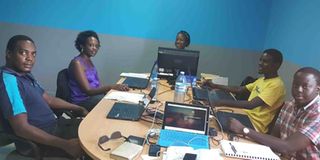Formalising mobile money payments

Part of the team at Smart Business Intelligence, who have come up with solutions that could help formalise mobile money business transactions among SMEs. Courtesy photo.
What you need to know:
A number of small companies have no formal records of their business transactions. However, Smart Business Intelligence has built a platform that will help SMEs track their transactions made through mobile money. Mark Keith Muhumuza tells the story.
Adoption of mobile money is fast paced with transactions reaching Shs24 trillion as of the end of 2014.
This is a growth of 2,392 per cent from Shs962.7b in 2010 when money services completed their first full year in Uganda.
In all this, mobile money continues to evolve from just being a tool for sending and receiving money but to paying bills including water, electricity, parking and school fees among others.
Commercial banks have not been left out as they are currently accepting deposits and withdrawals from customer bank accounts.
Traders around the country also receive mobile money payments but the missing link, however, is the ability to reconcile mobile money transactions to books of accounts in a timely and accurate way.
Formalising mobile phone payments
Mobile payments need to be linked to a proper accounting system, especially for SMEs.
And for this a Ugandan company, Smart Business Intelligence (sbintell.com), with a flagship SME product, MYAccounts (myaccounts.ug), thinks it can enable companies to account formally using the mobile money built platform.
“MYAccounts enables a seamless view that can track and account for all customer and supplier payments as well as other transactions made using mobile phones,” says Peter Muzoora, the project manager at Smart Business Intelligence.
“In includes all processes that can produce complete financial and stock records such as customer invoices, receipts, printable financial statements and tax returns,” he says.
In June 2015, the MYAccounts platform got a $100,000 (Shs345m) grant from the Bill and Melinda Gates Foundation. It was among at least another 1,800 projects that pitched their ideas.
As a startup, breaking into a market dominated by banks and telecom companies can be complex but Muzoora notes they will use the grant to scale their platform’s operations.
MYAccounts also won the Microsoft Innovation Award and grant in 2014.
The platform is subscription based at the moment and Muzoora believes the grant will provide them with the ability to make some risks including market trial runs – at least until when it becomes profitable.
Founding Smart Business Intelligence
The company was founded by Francis Otim, a chartered accountant with a background in banking and finance, whose focus was to support “African SMEs, to improve efficiency as well as boosting their bottom line through deploying smart and cost-effective solutions.
The company seeks to get a fair share of the more than 800,000 SME’s in the country, which could enable formal acceptance of mobile payments across the trading ecosystem.
“Uganda is one of the LDCs experiencing high failure rates of SMEs although it is ranked as one of the most entrepreneurial countries in the world and so we have made it our mission to ensure that African SMEs have access to affordable and relevant solutions for their business,” Otim says.
In a period when the country is looking to formalise the billions in informal trade, bookkeeping and filing tax returns remain some of the barriers.
Thus MYAccounts might ably provide a solution through formalizing traders’ mobile money transactions by generating invoicing and receipting systems.
The benefits accordingly are beyond the trader as it is likely that telecoms could see their transaction volumes inch upwards.
And for banks, it would translate into increased credit risk assurance as SMEs are able to formalise their books of accounts, allowing them to access loans.
Key financial findings
According to the 2013 Finscope Survey on financial inclusion conducted by the Economic Policy and Research Centre, at least 56 per cent of adult Uganda use mobile services.
“The survey results revealed that the majority of Ugandans mainly use mobile money services for cash withdraws (56 per cent), followed by cash deposits (27 per cent). Usage of mobile money services for other services like payment for utilities, school fees, and purchase of airtime remained low,” the survey report reads.
Notably, this trend is changing with organisations like Umeme and National Water and Sewerage Corporation pushing the buck on the mobile money payment option.
MYAccounts currently has about 2,000 clients in Uganda and Rwanda using the various tools available on both the web-based application and mobile phone applications.
The challenge, however, how they make SMEs know that they need to formalise their transactions, given that many relate such measures with involuntary taxation.
But Smart Business Intelligence will through partnerships the CPA firms and students extend their accounting support services to SMEs in the MYAccounts ecosystem.
The company trains CPA accountants on the system use and support and CPAs in turn use the system to efficiently support their already existing networks of SMEs.




